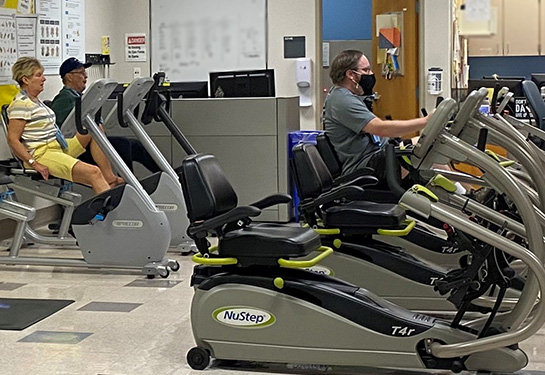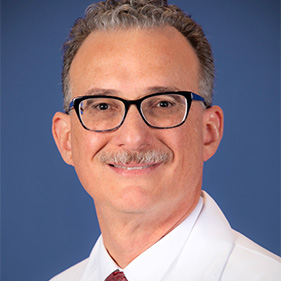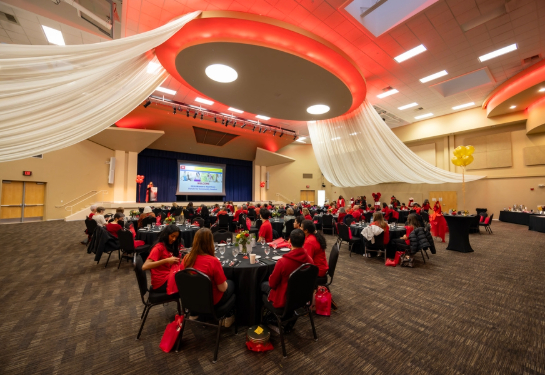Cardiac Rehabilitation Week spotlights effective program
Highly successful UC Davis Health Cardiac Rehabilitation Program calls attention to recovery from coronary events and heart procedures
Jesus De Loera was rushing through an airport in Chicago this past summer, trying to make his connecting flight to Sacramento, when he collapsed. He had gone into cardiac arrest: His heart was not beating; he was not breathing.
Fortunately, he was aided by two flight attendants who saved his life with CPR and an AED, or automated external defibrillator.
When De Loera eventually returned to Sacramento, he received world-class care from UC Davis Health’s highly successful Cardiac Rehabilitation Program, which combines exercise, lifestyle changes and education to help people recover from heart issues and prevent future complications.
“After having a coronary event, you have this constant fear that it is going to happen again because you do not understand what your limits really are,” said De Loera. “The cardiac rehab program helped alleviate that fear for me – allowing me to start living my life again.”
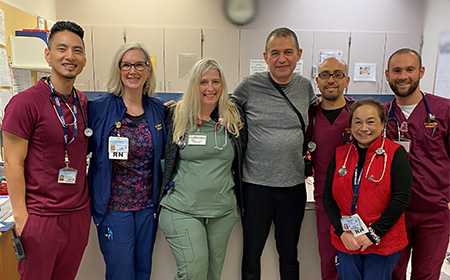
During cardiac rehabilitation week (Feb. 11-17), the program ’s leaders and patients are calling attention to the role of cardiac rehabilitation in reducing the potentially devastating effects of heart disease.
“Cardiac rehab helps patients regain strength and stamina after a heart procedure or an event like a heart attack,” said Javier E. López, associate professor of cardiovascular medicine and medical director of the Cardiac Rehabilitation Program. “At UC Davis, we believe in providing patients with immediate and long-term health benefits that will help them recover, get stronger and lower the risk of future heart problems.”
Every year, over 1 million Americans have a coronary event or undergo a cardiac-related procedure.
Heart patients affiliated with UC Davis Health have an opportunity to join the Cardiac Rehabilitation Program, which is housed at the Lawrence J. Ellison Ambulatory Care Center. The program’s location, which resembles an exercise gym, is ideal for patients such as De Loera who showed up three days a week, along with 15 other people working to recover their cardiac functions. De Loera completed one hour of exercise each visit and attended classes on healthy eating, physical activity, stress reduction and medication management.
“The program worked with us in a holistic way – educating us on how to eat better, exercise without pushing ourselves too hard and how to improve our overall health with simple lifestyle changes,” De Loera explained.
After graduation from the program, De Loera returned to his job as a distinguished professor of mathematics at the University of California, Davis. He is now a vegetarian and exercises regularly at the Activities and Recreation Center on the Davis campus.
At UC Davis, we believe in providing patients with immediate and long-term health benefits that will help them recover, get stronger and lower the risk of future heart problems.” —Javier E. López
A leader in cardiac rehabilitation
Established over two decades ago by Tissa Kappagoda and colleagues, the UC Davis Cardiac Rehabilitation Program was the first of its kind in the Sacramento region. As the region’s most experienced team, they provide patients who have undergone a coronary event a 12-week program with up to 90-minute exercise and education classes.
A team of cardiologists, exercise physiologists, registered nurses, registered dietitians, pharmacists, and health and behavior psychologists provide patients with one-on-one guidance and education to create a plan to help strengthen their heart and improve their overall health.
“Each plan is not a one-size-fits-all – it factors in specific needs and personal goals,” explained López. “We work with each patient through this process, ensuring they feel supported and motivated as they reach each milestone.”
The Cardiac Rehab Program is nationally certified by the American Association of Cardiovascular and Pulmonary Rehabilitation. This certification is an example of their commitment to patient safety, quality care and medical excellence. In the last year, the program’s achievements have included:
- Receiving the Comprehensive Heart Attack Certification from The Joint Commission
- Launching a secondary prevention, medication management program for high-risk patients living with hypertension and dyslipidemia
- Creating a new heart failure educational program for cardiac rehab patients and future heart transplant recipients
- Developing a cardiometabolic clinic to better serve high-risk cardiac rehab patients living with diabetes
“These accomplishments are the result of the tireless efforts of our cardiac rehab team, who work relentlessly to provide patient-centered care to all of our participants,” Lopez added.
Swimming to regain heart health
After experiencing severe chest pain, Gregg Fishman was hospitalized for a few days in 2022. Luckily, he did not have a heart attack – but needed medical intervention, nonetheless.
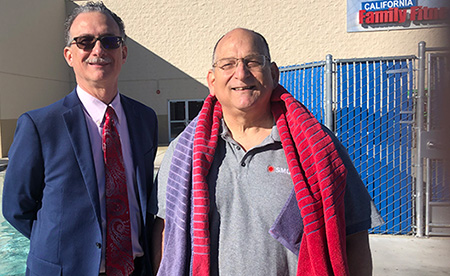
Gregg Fishman and Javier López together at swimming fundraiser.
Fishman was diagnosed with hypertension and mild to moderate coronary artery disease. To get his health back on track, he was referred to the cardiac rehab program. He soon began exercising and took classes that reinforced the heart healthy lifestyle that he said he knew he should have been following.
“After being hospitalized, it was the unknowns that were scary,” explained Fishman. “The holistic care I received in the cardiac rehab program motivated me to take better care of myself.”
On his 60th birthday, Fishman began to “swim his age” in laps. This year, his training allowed him to reach his 64-lap milestone a couple of years before his 64th birthday, so he decided to up the ante: He completed a 72-lap, one mile-swim. He then helped raise awareness for friends and family of the importance of exercise on heart health by inviting them to pledge a donation to the American Heart Association for each lap he completed.
“The swim was a testament to the help I received at the UC Davis Cardiac Rehab Clinic,” Fishman said. “I hope it can serve as a motivator for other ‘old fat guys’; to do whatever they can to increase their activity, feel better and be more heart healthy.”

